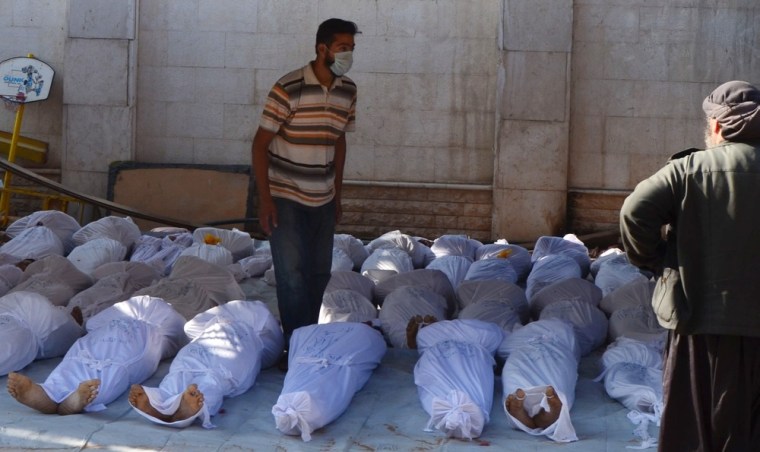The U.N. Security Council said Wednesday it was necessary to clarify reports from Syria's opposition that hundreds of civilians – including many women and children – have been killed in chemical weapons attacks.
The council, however, stopped short of demanding a probe by U.N. investigators in Syria -- although said it welcomed U.N. chief Ban Ki-moon's calls for one.
"There is a strong concern among council members about the allegations and a general sense that there must be clarity on what happened and the situation must be followed closely," Argentina's U.N. ambassador, Maria Cristina Perceval said following the emergency meeting.
Activists and rebel fighters accused Syrian President Bashar Assad’s forces of firing chemical-tipped weapons into rebel-held areas near the capital, Damascus, in the early hours.
The Obama administration "strongly condemned" the reported use of the weapons which, if confirmed, would be by far the worst known use of poison gas during the country’s deadly civil war.
The White House called for Assad to allow an immediate and transparent U.N. investigation of the incident.
White House spokesman Josh Earnest said Wednesday that a U.N. team is on the ground in Syria to conduct the investigation and acknowledged that the United States does not have independent confirmation that chemical weapons were used.
“We are hopeful that the Assad regime will follow through on what they have claimed previously, that they are interested in a credible investigation that gets to the bottom of reports that chemical weapons have been used,” Earnest said.
Videos apparently showing the graphic and disturbing aftermath of the alleged attacks on the rebel-held eastern Damascus suburb of Ghouta were posted to social media but could not be independently verified. The clips showed children choking and vomiting, while adults writhed in agony.
State television denied the opposition claims, which it said were disseminated deliberately to distract United Nations chemical weapons experts who arrived in the country on Monday.
Musab abu Qutada, a spokesman for the local military council of the Free Syria Army, who is in the area near where the attacks took place, said the death toll had reached more than 1,200. NBC News could not verify the claim.
Several towns and villages to the east and north of the capital were attacked by surface-to-surface missiles beginning around 2 a.m. Wednesday (7 p.m. Tuesday ET), the rebel spokesman said.

“The deceased and the wounded are in field hospitals,” he said in a Skype interview. “We have about 1,228 victims. We are in need of medicine. We are in need of medical staff.”
The “chemical bombardment” was so strong that doctors at the scene had also died from the effects of the gas, he said.
“There were some symptoms like numbing of the body, constricted pupils of the eye, foam coming out of the mouth, paleness of faces, shortness of breath," he said.
“The areas that were targeted were civilian areas, they are not military areas. They targeted women and children to apply pressure on the Free Syrian Army.”
The gas was heavy and sunk into basements, witnesses told NBC News. Some people lit tires on fire, hoping the smoke from the burning tires would offset the gas. The black smoke, however, only created more chaos and panic.
A doctor said some victims reported smelling a faint odor of insecticide at the time of the rocket attacks. Most of the victims were sleeping when the attacks took place.
The first rocket assaults on the eastern villages lasted roughly an hour; then, villages to the north began to be attacked in the same way -- surface-to-surface rockets that exploded to release a poison gas.
Conflicting death tolls from different sources could not immediately be reconciled by NBC News. Witness accounts are impossible to verify because Syria does not allow journalists to operate freely inside its borders.
The opposition Local Coordination Committees in Syria put the death toll at more than 755, saying several areas had been hit by “shelling with poisonous gases.”
It said the areas hit included Ein Tarma and Zamalka in eastern Ghouta and Mouadamieh in western Ghouta.
Susan Ahmad, who lives just over one mile from the areas, described a smell in the air and reported having burning, red eyes and dizziness after the attacks.
“There is a very strange smell and it’s a very ugly one,” she told NBC News’ U.K. partner ITV News. “It’s nasty. You feel like there is something wrong in the air."
She added: “The death toll is likely to be higher and higher because don’t have enough [medicine] to save lives.”
Bayan Baker, a nurse at a field hospital in Douma, told Reuters that the death toll from the attack, collated from medical centers in the region, was 213.
"Many of the casualties are women and children. They arrived with their pupils dilated, cold limbs and foam in their mouths. The doctors say these are typical symptoms of nerve gas victims," she said.
NBC News' Charlene Gubash, Ammar Cheikhomar and Becky Bratu, ITV News' Fadah Jassem and Juliet Bremner, and Reuters contributed to this report.
Related: